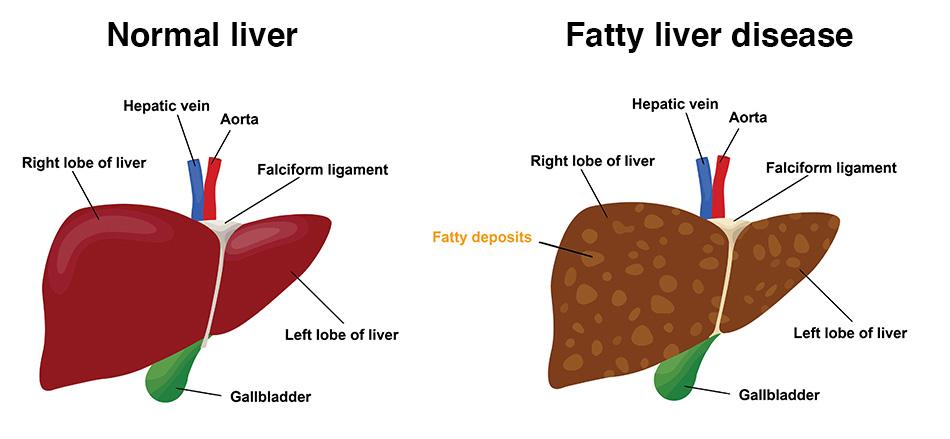
Exploring the Effects of Apple Cider Vinegar for Fatty Liver: A Comprehensive Review
Fatty liver disease, characterized by the accumulation of fat in the liver, has become a significant health concern globally. As individuals seek natural remedies, apple cider vinegar for fatty liver (ACV) has gained attention for its potential therapeutic effects.
In this comprehensive review, we will delve into the current scientific literature to explore the effects and benefits of apple cider vinegar for fatty liver disease. By examining the available evidence, we aim to provide an in-depth understanding of whether apple cider vinegar holds promise as a potential intervention for fatty liver. Read this article to know the mindful explanation on apple cider vinegar for fatty liver.
Understanding Fatty Liver Disease
Fatty liver disease encompasses a range of conditions, including non-alcoholic fatty liver disease (NAFLD) and it’s more severe form, non-alcoholic steatohepatitis (NASH). These conditions are characterized by excess fat accumulation in the liver, which can lead to inflammation, liver damage, and potential long-term complications such as cirrhosis and liver failure.

Lifestyle factors, including diet, obesity, and sedentary behavior, contribute to the development and progression of fatty liver disease.
The Nutritional Composition of Apple Cider Vinegar
Apple cider vinegar for fatty liver is derived from fermented apple juice and is known for its rich nutritional composition. It contains acetic acid, vitamins, minerals, polyphenols, and other bioactive compounds. The acetic acid content of apple cider vinegar is believed to be responsible for many of its potential health benefits.
Additionally, apple cider vinegar is low in calories and has been linked to improved blood sugar control and weight management, which are relevant factors in fatty liver disease.
Effects of Apple Cider Vinegar on Liver Health
Multiple studies have investigated the effects of apple cider vinegar for fatty liver, including its potential impact on fatty liver disease. Animal studies suggest that apple cider vinegar may reduce liver fat accumulation, improve lipid metabolism, and decrease inflammation in the liver.
Some human studies have reported similar findings, with ACV consumption associated with reduced liver enzyme levels, improved insulin sensitivity, and decreased body weight.
However, it’s important to note that the existing evidence is limited and often based on animal models or small-scale human studies. The mechanisms through which apple cider vinegar exerts its potential benefits on fatty liver.
Considerations and Limitations
While the preliminary findings on apple cider vinegar for fatty liver are promising, several considerations and limitations must be acknowledged. First, the majority of studies have been conducted on animals or in small human samples, warranting larger-scale and well-controlled trials.
Additionally, the optimal dosage, duration, and frequency of apple cider vinegar for fatty liver management are still unknown. Moreover, individual variations in response to apple cider vinegar may exist due to genetic factors, underlying health conditions, and lifestyle differences.
Incorporating Apple Cider Vinegar into Lifestyle Changes
Apple cider vinegar should be viewed as a potential adjunct to lifestyle changes rather than a standalone treatment for fatty liver disease. It is essential to prioritize a well-balanced diet, regular physical activity, weight management, and avoiding alcohol to effectively manage fatty liver disease.

Apple cider vinegar can be incorporated into the diet through salad dressings, marinades, or diluted with water as a beverage. However, it is important to exercise caution, as excessive consumption or undiluted use may lead to adverse effects such as tooth enamel erosion or gastrointestinal discomfort.
Exploring the Potential Mechanisms
While the exact mechanisms underlying the potential effects of apple cider vinegar for fatty liver remain uncertain, several theories have been proposed. One possible explanation is the acetic acid content in apple cider vinegar, which may promote fat breakdown and reduce fat synthesis in the liver. Acetic acid has been shown to increase the expression of genes involved in fat metabolism and inhibit enzymes involved in fatty acid synthesis.
Moreover, apple cider vinegar’s potential to improve insulin sensitivity may also contribute to its effects on fatty liver disease. Insulin resistance is closely associated with the development and progression of NAFLD. Some studies suggest that apple cider vinegar may enhance insulin signaling pathways, leading to improved glucose regulation and reduced fat accumulation in the liver.
Practical Considerations for Apple Cider Vinegar Consumption
When considering the use of apple cider vinegar for fatty liver, it’s important to keep practical considerations in mind. While it is generally safe for most individuals when consumed in moderate amounts, there are some precautions to be aware of. Undiluted or excessive consumption of apple cider vinegar can lead to tooth enamel erosion or irritation of the throat and digestive system. Therefore, it is recommended to dilute apple cider vinegar in water or incorporate it into recipes to minimize potential adverse effects.
Furthermore, individuals with certain health conditions, such as gastric ulcers, acid reflux, or kidney problems, should exercise caution and consult with their healthcare provider before regularly consuming apple cider vinegar.
Future Research Directions
Although preliminary research on apple cider vinegar and its potential effects on fatty liver disease shows promise, more rigorous studies are needed to validate its efficacy and safety.
Future research should focus on larger, well-controlled clinical trials with diverse populations to determine optimal dosages, durations, and frequency of apple cider vinegar consumption for fatty liver management.
Additionally, investigating the long-term effects of apple cider vinegar on fatty liver disease progression and outcomes is crucial. Understanding the potential interactions between apple cider vinegar and other interventions, such as dietary modifications and exercise, could provide valuable insights into the comprehensive management of fatty liver disease.
Conclusion
While the potential benefits of apple cider vinegar for fatty liver disease are intriguing, further research is needed to establish its effectiveness and safety. As a natural remedy, apple cider vinegar offers a holistic approach to liver health. However, individuals should consult healthcare professionals before implementing apple cider vinegar as part of their fatty liver management strategy.
A comprehensive lifestyle approach that includes a balanced diet, regular exercise, and other evidence-based interventions should be the primary focus for addressing fatty liver disease. By staying informed about ongoing research and maintaining a healthy lifestyle, individuals can take proactive steps toward liver health and overall well-being.
